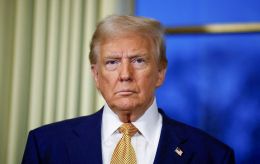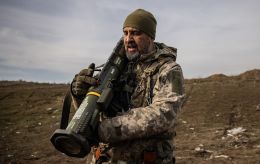Ukrainian Greek Catholic Church Head Sviatoslav: Vatican is not a mediator between Ukraine and Russia, no one requested it
 Head of the Ukrainian Greek Catholic Church, His Beatitude Sviatoslav (All photos: Vitalii Nosach/RBC-Ukraine)
Head of the Ukrainian Greek Catholic Church, His Beatitude Sviatoslav (All photos: Vitalii Nosach/RBC-Ukraine)
In a comprehensive interview with RBC-Ukraine, the Head of the Ukrainian Greek Catholic Church, the Major Archbishop of Kyiv-Halych, His Beatitude Sviatoslav, shared his insights into how the full-scale war has changed Ukrainian believers, relations with the Ukrainian government, Pope Francis, and the Orthodox Church of Ukraine, the threats posed by Moscow Orthodoxy, and the new calendar.
According to sociology, the full-scale Russian invasion has led to a sharp decrease in the number of believers in the Ukrainian Orthodox Church of the Moscow Patriarchate. As a result, the Ukrainian Greek Catholic Church (UGCC) has likely become the second-largest church in Ukraine, following the Orthodox Church of Ukraine.
However, the Head of the UGCC, Sviatoslav, told RBC-Ukraine that his church does not chase numbers of believers. He acknowledged, though, that the number of Greek Catholics has increased in recent years, and that Greek Catholics are the most active among all Ukrainian churches.
“There are indeed many people who feel betrayed by the Moscow Patriarchate Church. Experiencing the trauma and betrayal from their church is a very dangerous phenomenon we are witnessing. Sociology does not fully reflect this,” Sviatoslav said.
Apart from addressing fundamental issues such as how the war has impacted Ukrainian society and believers and how the church should respond to new challenges, we spoke extensively with the head of the UGCC about its relations with other Ukrainian churches and the Holy See. Pope Francis has made controversial statements regarding the Russia-Ukraine war. At the end of our conversation, we asked the head of the UGCC some general questions about his church and common stereotypes about religious customs in Ukraine.
Here is a concise text version of the conversation. Watch the full interview in the video.
Pope's controversial statements regarding Ukraine and Russia
“This is an example of how one can view tragedy from the perspective of a victim - that is our perspective. And the same tragedy can be viewed from the perspective of a universal arbiter, who sees the entire world and tries to serve all those suffering from wars and injustice, fulfilling the mission of a global peacemaker,” says Sviatoslav.
According to him, each media crisis catalyzes communication between the UGCC and the Vatican. The Greek Catholic Church remains a powerful voice for Ukraine.
“I use all the resources I have accumulated to communicate with Pope Francis. We were together in Argentina, where he was my direct superior. We’ve known each other for many years. Our diocese has always been part of the Buenos Aires metropolis.”
Can the Vatican mediate between Ukraine and Russia?
“As of now, I must state that no such mediation is taking place because specific conditions are required. Mediation is a diplomatic mechanism that depends on certain prerequisites,” states His Beatitude.
Sviatoslav explained that two conditions are necessary for mediation: first, both parties must agree to it and request a mediator; second, they must be prepared to implement recommendations made by the mediator.
“At the moment, neither condition is met. Over the past year, we have seen and heard of countless potential mediators. Some even called the Indian Prime Minister one of the most promising mediators. However, the political situation after the US elections has shifted everything again. The Vatican is not undertaking any mediation mission, nor has it been asked to do so.”
%20%D1%84%D0%BE%D1%82%D0%BE%20%D0%92%D1%96%D1%82%D0%B0%D0%BB%D1%96%D0%B8%CC%86%20%D0%9D%D0%BE%D1%81%D0%B0%D1%87%20%D0%A0%D0%91%D0%9A-%D0%A3%D0%BA%D1%80%D0%B0%D1%96%CC%88%D0%BD%D0%B0-93.jpg)
At the same time, the Pope is involved in negotiations concerning the return of Ukrainian children and prisoner exchanges.
“The Vatican has chosen to focus on aspects of the peace formula that fall within the Church’s competence as a subject of international law. In this area, the Holy See is working methodically and consistently to benefit Ukraine.”
How Ukrainians and the Church have changed during the full-scale war
“When it comes to believers, the relationship between people and God, as well as the rules and habits of spiritual and religious life, has radically changed. We can say that we have all become different,” said the Head of UGCC.
He added that much of what foreigners knew about Ukraine is now in the past.
“I tell everyone: ‘The Ukraine you knew before no longer exists.' We will not be the same. But we want to be better. Having endured and still enduring this tragedy, I believe we are experiencing a moment of a new birth. I would say, rebirth.”
Relations between the UGCC and the state
Sviatoslav emphasized that the state is beginning to recognize the role and place of the church during wartime turmoil in Ukrainian society.
“Gradually, our statesmen understand that religious life and the church are the secret to success and the source of true victory.”
The UGCC holds a unique position among other churches and religious organizations.
“We are a church closely related to our Orthodox brethren through history and roots. We are a church of Kyivan Christianity, yet we live in full communion with the universal Catholic Church. This enables us to be part of the global Christian network. Half of our church’s structures are located outside Ukraine.”
The head of the UGCC noted that the church’s historical globalization during various periods of Ukrainian emigration, starting in the late 19th century, has been reactivated to support Ukraine and its statehood today.
“I feel that our leadership is beginning to look forward soberly, considering how to preserve Ukraine, even when - God willing - the war ends, though we don’t yet know how. The state sees that the religious environment provides an anchor of stability for society.”
_3.jpg)
Moscow Orthodoxy and the Ukrainian diaspora
Sviatoslav confirmed that Moscow Orthodoxy is trying to attract Ukrainians from the new diaspora.
“In various European countries, this is felt differently. But where leaders of Ukrainian communities speak openly about it is in Germany. Pro-Russian oligarchs who fled Ukraine have created parallel Ukrainian communities there using Russian money, targeting, among others, Russian-speaking Ukrainians. They bring priests from the Moscow church in Ukraine to establish religious centers aimed at luring these people.”
He added that these efforts aim to create a protest potential from Ukrainian emigrants, who can later oppose their state’s policies, advocating for “peace in the world” in the context of the “Russian world.”
Possibility of uniting the UGCC with Ukrainian Orthodox churches
Sviatoslav stated that it is premature to talk about uniting the UGCC with Orthodox churches in Ukraine.
“When it comes to potential unification, I would not be overly optimistic or set any timelines. Why? Because today, I don’t see even the beginnings of a dialogue about unification. Currently, Orthodoxy in Ukraine faces different challenges and priorities.”
He explained that the processes within Ukrainian Orthodoxy are complex, particularly concerning the presence of a church connected to Russia.
“We see what is happening with the part of Orthodoxy still connected in some way to the Moscow Patriarchate. It’s clear that certain stages of development and consolidation within the Ukrainian Orthodox community must be respected.”
Law on the Russian Church ban
Sviatoslav believes the state has the right and obligation to protect Ukraine’s religious environment from manipulation by the aggressor country.
“We explain to everyone that this law is not about banning. It’s about protection.”
At the same time, His Beatitude noted that the law is “not flawless; it’s not a page from the Gospel.”
The effectiveness of the law in practice remains to be seen.
“Many of our country’s laws are often merely declarative. But when it comes to implementation, things sometimes stall,” concludes Sviatoslav.
%20%D1%84%D0%BE%D1%82%D0%BE%20%D0%92%D1%96%D1%82%D0%B0%D0%BB%D1%96%D0%B8%CC%86%20%D0%9D%D0%BE%D1%81%D0%B0%D1%87%20%D0%A0%D0%91%D0%9A-%D0%A3%D0%BA%D1%80%D0%B0%D1%96%CC%88%D0%BD%D0%B0-105.jpg)
Transitioning to a new church calendar
The Head of UGCC noted that this reform was implemented surprisingly smoothly and unanimously.
“Out of all our communities in Ukraine - of which we have many - only one parish in Kharkiv requested a postponement. The rest transitioned without issue. It felt like an unprecedented sense of unity. When our people realized that church leaders were truly their leaders, we felt they were following us.”
He added that reforming the Paschalion is next. Part of the Greek Catholic Church abroad celebrates Easter with the Latin Church, while in Ukraine, the decision was made to celebrate with Orthodox brethren to maintain unity.
“I had very interesting conversations about this with the Ecumenical Patriarch Bartholomew just a month ago and with Pope Francis. It seems that the coming year will spark discussions on the global level about the necessity and possibility of a common Paschal reform. But we feel we are still at the beginning of a very long process.”

